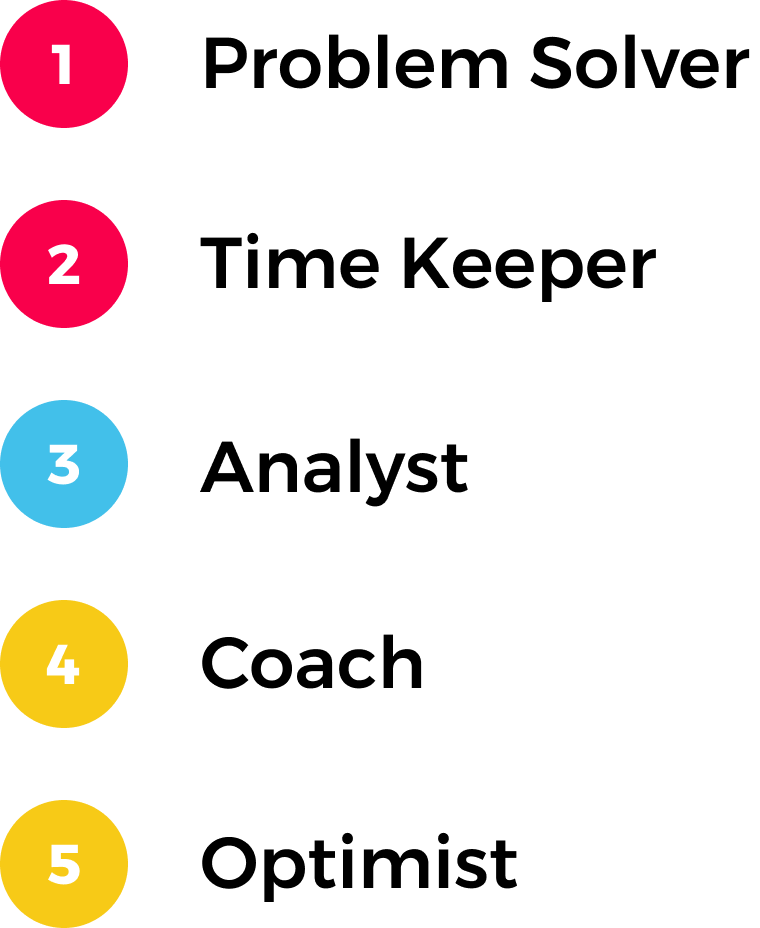There are many key strengths of dyslexics that you should be aware of. While most people think of dyslexia as a disability, it can actually be an incredible spire of strengths. Instead of viewing it as something that holds you back, it can be the major driver behind your personal success and progress.
If you are looking for a way to turn your negative views on dyslexia around, and acquire your strengths through dyslexia, it may seem tough at first. It is natural to think that dyslexia can only hold you back; after all, many people are told this throughout their life.
In this article, we will cover how dyslexia can be a source of strength and how you can use it to your benefit.
What is Dyslexia?
Some describe dyslexia as a form of learning disability. Most individuals are diagnosed with the condition during childhood. It can make reading more challenging.
This is so because the letters may seem twisted, backward, and otherwise difficult to process. Because of this, performing standard reading tasks could be a challenge for people with dyslexia. They may not be the best at visual thinking and learning.
In addition to reading, some dyslexics also struggle with writing and/or spelling. In general, tasks relating to language are sometimes difficult to accomplish for dyslexic children and adults alike.
However, it is possible to overcome these challenges and use dyslexia as a strength. People see the impact of dyslexia most at school. They may not be able to finish homework assignments or read well.
This could cause trouble for their grades. Working with numbers may also be a challenge, as the numbers may seem to get out of place, be flipped, and so on.
It is important to remember dyslexia does not someone is not intelligent. Many brilliant and famous people have this condition and go on to achieve immense success.
Why Is Important To Recognize Strengths of Dyslexia & Their Benefits
Being aware of your dyslexic strengths can help you in numerous ways. Your dyslexic strengths can help you gain new learning skills, become effective motivated, and so much more. In general, understanding your strengths can help you unlock new opportunities that you never knew were open to you.
Some of the key benefits of recognizing your strengths as someone with dyslexia include:
- A boost in positivity and building the ability to see the glass half full
- Becoming more productive and efficient
- Learning how you work and learn best to increase your learning abilities
- Getting the ability to advocate for yourself in social settings
- Knowing how to “sell yourself” and appeal to interviewers when seeking a job
- Performing activities that you never thought you could do
- Taking intelligent and calculated risks that can pay off in the long run
- Becoming more self-aware and confident in your abilities
- Boosting your patience with yourself and others, thus becoming a better team player
- Setting goals that are more personalized and unique to your current situation
10 Strengths of Dyslexia
Dyslexia is not typically seen as a source of strength. In fact, most people believe that dyslexia is a condition that will hold them back and limit them. However, this could not be further from the truth.
People with dyslexia are often quite successful and have many unique strengths. Some of the most brilliant people of the last few hundred years, including the likes of Einstein and Walt Disney, had dyslexia.
Key strengths that set dyslexics apart from the rest include the following:
Creative
Creativity can be a major asset for those with dyslexia. They are great at finding unique ways to approach problems. Also, individuals with dyslexia tend to be skilled in artistic and creative endeavors. Some of the greatest artists of all time had dyslexia.
For instance, both Picasso and Pollock had the condition. A dyslexic’s creativity can also help set them apart in the business world, as it helps them acquire a competitive advantage. Their creativity could also help them create imaginative stories and succeed as writers, despite the technical challenges of dyslexia.
Big Picture Thinker
Too many people waste time obsessing over minute details. However, dyslexics tend to think about the big picture. They are great at spotting and understanding patterns and thinking in the long term.
They can remember similar structures and make accurate conclusions from their observations. These strengths allow them to excel in math and science, both at school and beyond.
Observant
Dyslexic people are able to harness their pattern recognition skills to be highly observant. They can even notice small changes in data, for example.
Being great at observation allows individuals to think critically, and rationally, and make decisions in an effective manner. It ensures that they catch errors and changes that many others would not notice.
Extremely Empathetic
Empathy is a key soft skill that is beneficial in nearly all settings. Being able to empathize with others allows you to build bonds with individuals, boost your positivity, increase productivity, and make the most out of your career.
Dyslexic people are great at reading others’ emotions and making accurate conclusions. They can place themselves in others’ shoes quite well, giving them this crucial strength for life.
Unique Reasoning Style
As previously noted, dyslexic people have a plethora of creative strengths. This also applies to how they approach reasoning. Their unique method is known as narrative reasoning.
It combines pattern analysis, simplifying data, analyzing the logic of an argument, interpreting patterns, and looking beyond the details to find an overarching strategy. This unique reasoning type can also help dyslexics break down complex ideas into more manageable notions, thus helping them learn.
Connecting With Others
Contrary to what some may believe, individuals with dyslexia are great at connecting with others. They can utilize their empathetic skills to better understand those around them.
They can also sense even slight changes in their mood, tone, or body language, contributing to a deeper understanding of the other individuals’ emotions. As such, dyslexics can be great team players.
Using 3D Thinking And Stations Reasoning
It can be difficult for many individuals to think about items in 3 dimensions. However, this unique 3-dimensional strength allows people with dyslexia to visualize materials in a highly unique and innovative way. This could explain why some of the most famous fashion designers, architects, and sculptors had some form of dyslexia.
Thinking Critically
The ability to think critically is one of the many strong skills that set dyslexics apart from the crowd. Critical thinking is used in their everyday decision-making; it is second nature to most dyslexics.
Excellent thinking skills and three-dimensional thinking combine to form one of the most interesting approaches to problems. It is both rational and artistic at the same time.
Great At Communicating
While reading (and sometimes writing) may not be the dyslexic’s strong suit, verbal communication is one of their many strengths. Individuals with dyslexia are gifted storytellers, and they know how to sell products, too. Their creativity, rationality, and empathy combine to form great pitchers and amazing team communicators.
Willing To Experiment
Sometimes, you have to try new things to see which strategies work best. Dyslexic individuals are not afraid of trying new strategies to solve problems, even if it means they fail the first few times (or more). They view this as a learning opportunity.
And, when they do fail, dyslexics tend it learn quickly and efficiently. Their fast problem-solving abilities are traced to their ability to think laterally and rationally.
How To Identify and Develop Your Dyslexia Strengths (Kids & Adult)
Knowing your strengths can benefit you at any point in your life. The sooner you realize your strengths, the quicker you can start building on the strengths you have. This will help you grow as a person and reach your potential. If you think learning about your dyslexia-related strengths must be complicated, think again!
There are a few strategies that will make the strength discovery process seamless. For one, the best first step to take is to find a reliable online strengths assessment. One such tool is the HIGH5 test. The questions there are clear and straightforward.
You could even finish the test in one sitting. Plus, another key benefit of using a strength test like HIGH5 is the many other types of strengths you learn about. You will not just get a list of your dyslexia-related strengths. You also get the chance to see your emotional strengths, organization, and much more.
In addition to this, there are a few other approaches you could use. For instance, you could ask your boss or coworkers for input on your strengths. Or, you could analyze which abilities lead to prior successes and look for patterns. These methods are less accurate and more time-consuming, though.
How To Improve Dyslexia Strengths in the Workplace
Once you know your strengths, it is time to work on improving them. There are numerous ways to approach this goal. Firstly, you need to know when and how your strengths work best.
Focus on the environment that makes you feel the most confident and least distracted. Notice any patterns for when your strengths shine and when they are less effective. Try to ensure your environment is optimal whenever possible.
It can also be helpful for you to gain some confidence. Becoming more confident is a great way to take your strengths to the next level. Put yourself in situations that allow you to harness your strengths.
For example, if you know that you are great at communicating, do not be afraid to speak up more during meetings. If you are highly creative and great at problem-solving, try taking up more responsibilities for leading the team when given the chance.
Another way you can work on your strengths is by asking others for feedback. They can offer some great advice on how well your strengths have been developing. It is best if you can include some objective metrics for the most accurate strength improvement results.
For instance, if you want to track productivity and you are a salesperson, you could keep track of items sold or phone calls made.
How To Highlight Dyslexia Strengths In Resume & Job Interview
Your strengths are a major part of your candidate profile and potential for success at work. As such, you should surely ensure that your interviewer and potential employers are aware of your key abilities. However, you must truly prove you have strengths instead of just saying you do.
Your dyslexia-related strengths could potentially set you apart from the crowd. For instance, your unique method of problem-solving, empathy, and creativity can pique an interviewer’s interest.
One way to display these amazing abilities is by showing the impact your strengths had on your prior workplaces. Give specific examples and statistics to prove these strengths can benefit the employer.
In addition, you can make your strengths seem even more impactful to the business if you match the strengths the employer desires. If you look at the job posting, you can see some of the necessary strengths for your desired position.
If you can prove that you have these strengths, you will seem like a qualified and unique candidate. This will boost your likelihood of getting hired.
Bonus Tip: 5 Examples of Weaknesses of Dyslexia
Individuals with dyslexia have some amazing and unique strengths. From their dynamic reasoning strengths to their ability to effectively empathize with others, there is no doubt that dyslexia can be a source of strength rather than a negative influence in one’s life. However, just like with any other individuals, those with dyslexia also have some weaknesses.
Some of these weak abilities include:
- Struggling with reading and writing
- Making careless errors
- Poor self-confidence
- Misunderstanding others
- Being socially awkward
How To Improve Dyslexia Weaknesses To Strengths
If you want to improve your weaknesses, then there are a few simple steps you should take. However, you should also keep in mind that focusing on your weaknesses is ineffective. It is far better to focus on building strengths you already have rather than growing your weaknesses.
However, if you are keen on improving your weaknesses, you should start by understanding what your weaknesses are. Once you know that, find out when you use these weaknesses. Try to optimize your environment so that distractions and negativity do not inhibit your ability to use a skill.
Additionally, you could also try exposing yourself to situations where you must use your weaknesses. The more you use your weaknesses, the more opportunities you have to grow them into strengths. Note when you use these weaknesses and try to practice utilizing them as soon as possible.
Strengths of Dyslexia FAQs
Why dyslexia is an advantage?
Many people think of dyslexia as a form of learning disorder. However, it can be a source of great good in someone’s life. For instance, dyslexia can help individuals better empathize with those around them. It can boost their ability to think creatively and problem solve effectively.
Their unique reasoning approach and willingness to try new things can help dyslexics stand apart from the crowd. This will increase your odds of being hired. A few other benefits of dyslexia include being a great storyteller, finding patterns easier than others, using 3D thinking, being highly observant, and so much more.
What jobs are dyslexics good at?
There are quite a few careers in which dyslexics can find success. Remember: dyslexia is not an intellectual failing, and many of the world’s most creative and intelligent individuals had/have dyslexia.
For instance, both Albert Einstein and Richard Branson had dyslexia. Some of the top jobs for individuals with dyslexia include being an artist, musician, designer, photographer, actor, scientist, physician, surgeon, engineer, entrepreneur, and essentially any other similar job title.









